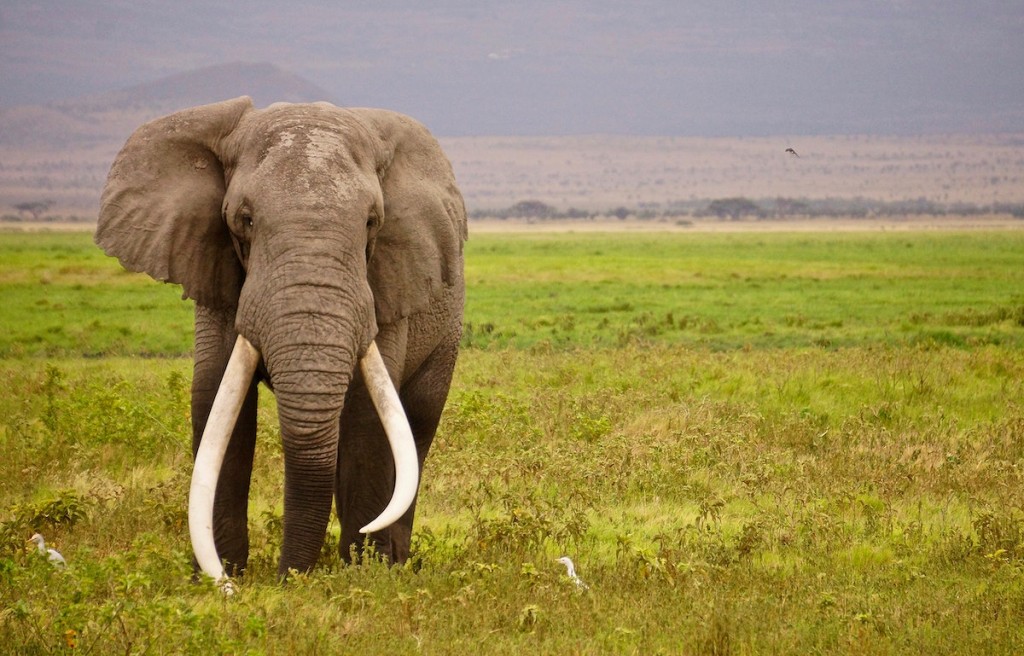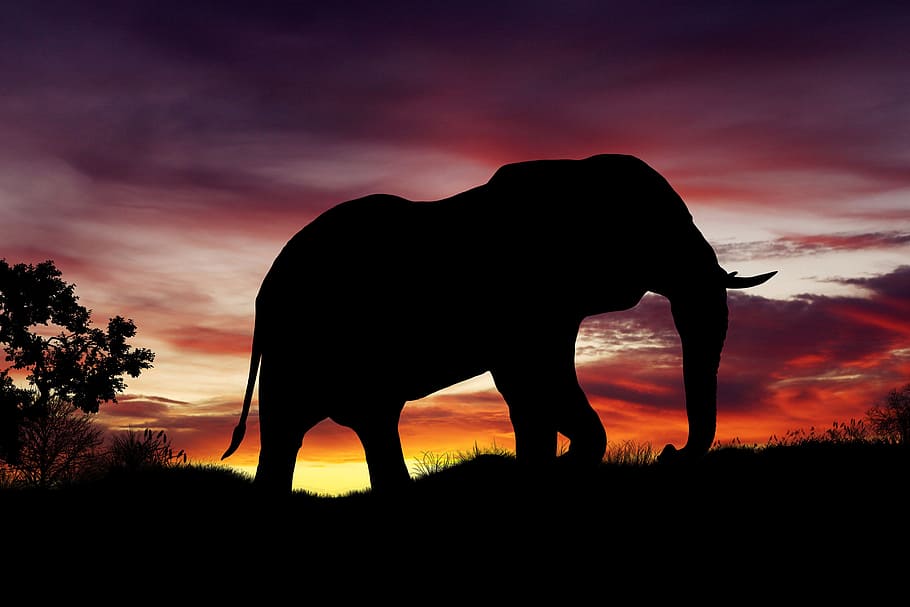
Trying elephant meat might sound exciting to those who enjoy trying new foods. Even though it’s difficult, some people in Africa and Asia still hunt and eat elephants for different parts like meat and ivory.
They say that elephant meat has a unique and yummy taste. Today, we will discuss what elephant meat is like and what you should understand before trying it.
What Does Elephant Meat Taste Like?
The taste of elephant meat is a complex blend of flavors similar to beef or veal, with a hint of flavor influenced by the elephant’s herbivorous diet.

While most parts of the elephant are edible, preferences exist. The trunk, ears, and tongue are commonly consumed, with certain cuts from the rib area considered the most tender.
What Factors Contribute to the Taste of Elephant Meat?
After trying elephant meat, our friends shared mixed opinions – some didn’t like the taste, while others found it yummy. It made us curious, so we looked into why the taste can be different.
However, elephant meat’s exact flavor and taste can vary due to multiple factors, but the most crucial are the cooking method and the seasonings used. If you still have questions or doubts about the taste of elephant meat, let’s uncover more:
Habitat and Environment
The taste of elephant flesh varies depending on the diet and living conditions. Although they are strictly herbivores, elephants eat a wide variety of foods depending on what they can find in their environment. Some elephants in the savanna eat only grass and herbs that grow there.

But when grass is not easy to find, especially in the dry season, they might eat trees and bushes. Elephants that live in the savanna have a more diverse diet than those in the tropical forest. Forest elephants mostly eat leaves, fruits, and bark, and sometimes lick clay and salt.
The variety of plants an elephant consumes can affect the flavor and aroma of its meat. Compared to other plants’ leaves and fruits, grass’s flavor is softer and sweeter. Bark and minerals can also affect the flavor and tenderness of the meat.
Where elephants live can also change the taste of meat. Parasites, diseases, and toxins in elephants’ natural habitat can infect the animals. Elephants’ favorite plants may contain cyanide or tannins, which can cause human poisoning or gastrointestinal distress.
Suggested Reading: What Does Asparagus Taste Like? Is It Awful?
Processing and Preparation
How elephant meat is seasoned and marinated plays a role in its taste, either by enhancing or masking flavors, affecting its overall enjoyment. The cooking method chosen can also impact the meat’s flavor and texture, with options such as roasting, boiling, stewing, frying, and smoking.

The specific part of the elephant used for cooking also contributes to the meat’s taste. Different parts offer varying flavors and textures. Some popular choices include the trunk, tongue, ears, ribs, legs, tail, and heart. Each part brings its unique taste to the overall culinary experience.
- The tongue is tender and juicy and carries a hint of sweetness like beef.
- The ears are thin and crunchy and bring a mild bacon-like flavor.
- The ribs are thick and fatty and provide a strong taste resembling a lamb.
- The legs are tough, lean, and have a gamey essence similar to venison.
- The tail’s thinness lends it a chewy texture, much like jerky.
- Lastly, the heart is large and muscular and boasts a rich taste akin to the liver.
Age
Age is one of the factors that can affect the taste of elephant meat. Generally, younger elephants have more tender and milder meat than older ones. As their muscle fibers are softer at this age it can impact the texture and overall palatability of the meat. Younger elephants also have less fat and more moisture in their meat, making it juicy and succulent.

On the other hand, older elephants have more dense and fibrous meat than younger ones. It can make it harder to chew and digest. These elephants also have more fat and less moisture with dry and greasy meat. The fat of older elephants can also have a strong and unpleasant smell that also affects their taste.
Stress and Physical Condition
The elephant’s health and tranquility just before it dies can alter the meat’s flavor and texture. When an elephant feels threatened or anxious, it releases certain hormones. Meat produced with these factors may not have optimal flavor. Adrenaline is a stress hormone that an elephant may release.
This hormone makes the elephant’s body use up its energy, which can lead to its death. When the elephant dies, there’s not enough of a lactic acid substance. It might mean the elephant didn’t have enough food.
Because of this, the meat might not taste the same as before. Sometimes, it can become tough, lose flavor, and sour.
Related: What Do Snails Taste Like? Do They Taste Good or Bad?
Cultural Perceptions
Different cultures have different feelings about eating special foods like elephants. Some places celebrate eating strange meats, while others don’t like it. In certain parts of Africa, eating elephant meat can show the wealth and status of people.

However, in other places, eating elephant meat is considered unhealthy. Elephants are smart, social animals that talk to each other and have traditions from their families. Some people also believe that killing and eating elephants is wrong due to religious beliefs.
Benefits of Eating Elephant Meat
Although not common, elephant meat consumption has the following benefits.
Lean and Low in Cholesterol
- Elephant meat has very little fat, similar to the fat content in pigs.
- It’s also low in cholesterol, which is good for heart health.
Abundant in B-Vitamins
- Because elephants eat various foods like nuts, grasses, fruits, and shrubs, their meat contains more B vitamins than other animals.
- B vitamins are important for energy and maintaining a healthy body.
High Iron Content
- Elephant meat contains a lot of iron, which is important for carrying oxygen.
- It has 46% more iron than beef, making it a good source of this essential nutrient.
Rich in Potassium and Vitamin C
- Elephant meat has more potassium and vitamin C than meats like beef, pork, or chicken.
- Potassium helps with nerve and muscle function, and vitamin C is great for our immune system and skin health.
Boosting Immune System with Zinc:
- Elephant meat has a good amount of zinc (2.4 mg per 100 grams), which can help make our immune system stronger.
- A strong immune system helps us stay healthy and fight off illnesses.
Plenty of Protein
- Elephant meat is a great source of protein, which is important for building muscles and repairing our bodies.
- It actually has more protein per 100g than any other animal food, including beef.
Low-Carbohydrate Option
- Because elephants mainly eat grass, their meat is low in carbohydrates.
- This can be good for people who need to control their blood sugar levels, like those with diabetes or following a ketogenic diet.
Editor’s Pick: 5 Reasons to Put Ice Cube on Burger While Grilling
Things to Consider Before Eating Elephant Meat
We’ve informed you that eating elephant meat isn’t permitted everywhere. You might encounter challenges if you’re in a new location and planning to try elephant meat. So, when you’re thinking about tasting elephant meat, keep these factors in mind.

Legal Status
It’s crucial to know that hunting and trading elephants or their parts, like meat or ivory, is against the law in most countries. These animals are protected by global rules, like the Convention on International Trade in Endangered Species of Wild Fauna and Flora (CITES).
- CITES Appendix I: It includes species threatened with extinction. This listing prohibits international trade in elephant products, including meat, except under specific circumstances. National laws in countries with elephant populations often prohibit hunting, killing, and trading in elephant meat, with penalties that can include fines and imprisonment.
- African Elephant Conservation Act (AECA): This United States law, also known as the African Elephant Conservation Act, was enacted to support the conservation of African elephants by regulating the import, export, and sale of African elephant ivory. While it primarily focuses on ivory, its provisions can indirectly impact elephant meat consumption by addressing the broader issue of elephant conservation.
- African Elephant Action Plan: This action plan, adopted by African elephant range states under the African Elephant Specialist Group, outlines strategies and measures for conserving and managing African elephants. It emphasizes addressing threats like poaching, habitat loss, and illegal trade. By focusing on comprehensive conservation, this plan contributes to protecting elephants from various forms of harm, including consumption.
- African Elephant Conservation Act of 1988 (AECA): This U.S. law prohibits importing ivory and other elephant products from African elephants killed after 1989. While the focus is primarily on ivory, this law indirectly addresses the killing of elephants for their products, including meat. It reflects efforts to curb the demand for elephant products and support their conservation.
- European Union Wildlife Trade Regulations: The European Union has established regulations to control the import, export, and trade of wildlife products, including those from elephants. These regulations aim to ensure that wildlife trade is sustainable and legal, and they include measures to prevent the import of illegally sourced animal products, including elephant meat. This indirectly contributes to the prevention of elephant killing for meat and other products.
Ethical Considerations
Elephants are intelligent and social creatures with rich traditions. Eating their meat can raise moral questions. For example, Buddhist monks are forbidden from eating elephant meat. Hindus also strictly avoid contact with elephant meat due to the importance of the god Ganesha, whom Hindus widely worship.
Conclusion
Anyone can have a weird craving, and it is perfectly fine if you feel like trying out elephant meat. We don’t recommend having it for a consistent diet but just for trying out. Since it is an endangered animal, the best we can do is play our part in protecting it.
What Does Elephant Meat Taste Like? - FAQs
The taste of elephant meat is often described as similar to tough game meats like beef or pork, but with some unique differences. Its flavor can vary depending on factors such as the elephant’s diet and age.
No, consuming elephant meat is not common. It’s generally discouraged and, in many places, illegal due to the conservation concerns surrounding elephants’ endangered status.
Elephant meat’s dense and fibrous texture can impact its taste by making it tougher to chew. Chewing helps release flavors, so the challenging texture might affect how well the meat’s flavors are experienced.
Yes, an elephant’s herbivorous diet can influence the taste of its meat. Since elephants primarily eat plants like grasses, leaves, and fruits, their diet might contribute subtle flavors to the meat.
![What To Wear To a Drag Show? [HOTTEST Outfit Ideas]](https://hopdes.com/wp-content/uploads/2024/01/What-to-wear-to-a-Drag-Show-390x220.jpg)



![What to Wear to an Outdoor Concert? [Cute Outfit Ideas]](https://hopdes.com/wp-content/uploads/2023/11/What-to-Wear-to-an-Outdoor-Concert-Cute-Outfit-Ideas-390x220.jpg)
